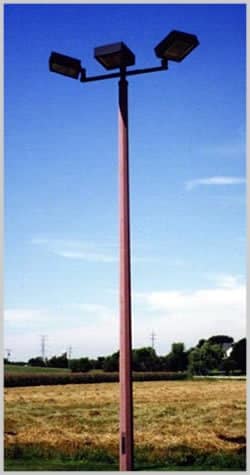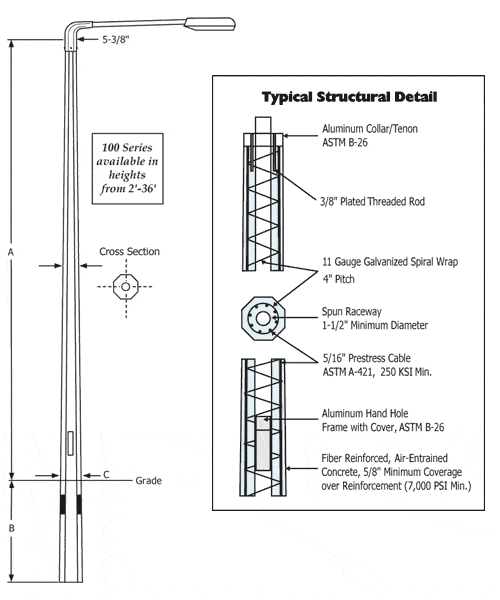There are several projects for which you might find a need to install concrete commercial light poles. Among these uses are mounting lights for tennis courts, sports arenas, and street lamps. Concrete poles have similar strength advantages seen with those made of metal, but lack the conductivity. This makes concrete preferable for electrical mounting applications. If you intend to install concrete sports light poles yourself, you will need to acquaint yourself with the mounting methods as well as knowing how to select the correct pole for your project. Once you know the basics, installing these poles can be a simple task.
Concrete poles have similar strength advantages seen with those made of metal, but lack the conductivity. This makes concrete preferable for electrical mounting applications. If you intend to install concrete sports light poles yourself, you will need to acquaint yourself with the mounting methods as well as knowing how to select the correct pole for your project. Once you know the basics, installing these poles can be a simple task.
Parking Lot Lighting
When you are trying to determine which concrete commercial light pole mount is best for your project, you need to gather some specifics about the job to narrow down your choices. First of all, how high will the light be from the ground? The mount height of the pole measures from the ground to the base of the lamp, while the height of the light is from the ground to the lamp itself. If your lamp is to be mounted on an arm atop the pole mount, what is the area lit? This number, measured in square feet, is called the Effective Projected Area (EPA). You will also need to know how far away from the pole the lamp will be from the commercial outdoor pole light. This is the horizontal distance which will be the same as the length of the arm to which the lamp is attached. Once you know these numbers take a look at a wind speed map from your concrete light pole manufacturer. After finding the average wind speeds encountered in your area of the United States, you will need to go to a graph provided by the manufacturer. There will likely be a separate graph for different wind speeds. If the average wind in your area is 100 mph, then you would use the 100 mph graph. The numbers on the bottom of the graph, the x-axis, will be the EPA or the area lit by the lamp. The numbers along the side of the graph, on the y-axis, is the length of the arm holding up the lamp. The intersection of these points on the graph will tell you the class of concrete light pole that you will need to purchase. If it falls between two classes, you will need the higher of the two in the pole selection guide.
Now that you know the class of concrete light pole you need, how will you mount it? There are three common methods. The easiest and most common is a direct embedment. This is where the pole is placed into a prepared hole with a granular base for drainage in the ground and recovered with the soil. Other forms of mounting include base plate and socket. Base plate mounting involves anchoring the plates into a pre-poured, or pre-existing concrete foundation. Socket mounting also requires a concrete poured foundation where the light pole might be mounted even with the ground level, or built up higher for added strength. The mounting method will determine the length of light pole you will need. If you intend to use the simple direct embedment, then you will need to add 10% of the pole’s height plus an additional two feet. Add these two numbers to the height you need the light to be from the ground and then order the length of concrete light pole which comes the closest.
Other decisions to make for your light pole installation are less technical. You need to be able to specify the finish, color, and style of the pole. If you are unsure about what equipment you need additionally to install your concrete light pole, you should consult with an expert. Carefully follow the directions included with your light pole provided by the manufacturer. Once you have followed these tips and guidelines, installing the poles should be quick and easy. Why not let the professionals at LED Spot gives you a hand with design or a customized quote. Commercial parking lot lighting packages can be more affordable than you think.




